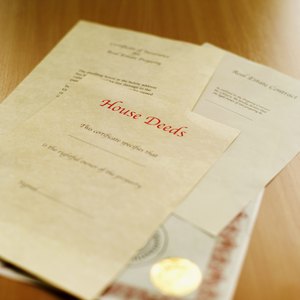
Most property conveyed in Georgia is transferred by warranty deed. Although a general warranty deed is most common, other types of deeds, such as limited warranty deeds and quitclaim deeds, also convey property. A buyer usually desires a warranty deed from the seller as this contains promises about the quality of the seller's title. However, there may be circumstances where a seller is only willing to provide a quitclaim deed.
What is a Warranty Deed in Georgia?
As its name implies, a warranty deed is document that transfers title and offers warranties, or promises, regarding the title. For example, the seller will warrant that he owns the property free and clear, and that there are no clouds on the title that would interfere with the buyer's ownership. General warranty deeds warrant the property throughout its history while limited warranty deeds only warrant the property from the time the seller acquired it to its conveyance to the buyer. Wording in a warranty deed, such as “grantor forever warrants and defends the title to the grantee, his heirs and assigns,” obligates the seller to his buyer and the buyer's heirs. A buyer who sustains a loss as a result of a title defect that existed prior to the warranty deed may look to the seller for compensation under those warranties.
Warranty Deeds Not for Everyone
A property owner may own a fractional interest in the property with joint or co-owners. As such, he can't warrant title for the entire property's ownership and usually hesitates to offer assurances to a buyer through a warranty deed. Heirs who are unfamiliar with property they inherited or an owner who inadvertently retained rights in property through an erroneous legal description, could convey by quitclaim deed. Whatever interest an owner has can be conveyed while offering no warranties to the buyer.
Divorcees Prefer To Quitclaim Deed in Georgia
Quitclaim deeds are often the deed of choice in a divorce. If a husband and wife allocate property rights, neither may choose to offer title warranties to the other spouse. When a divorce decree calls for one spouse to deed to the other, it usually states that the deeding party will “quitclaim” his interest in the property. Quitclaim deeds resulting from a divorce settlement in Georgia also offer recording tax advantages over a warranty deed.
Errors That Can Cloud Title
Heirs who failed to sign a deed conveying inherited property, overlapping boundary lines or an improperly abandoned easement may all create title problems for a property owner. Once these defects have been discovered by a title search or otherwise, quitclaim deeds may be required from those who retain property interests to clear the title for the intended owners.
References
Writer Bio
Marie Murdock has been employed in the legal and title insurance industries for over 25 years. Murdock was first published in print in 1979 and has been writing online articles since mid-2010. Her articles have appeared on LegalZoom and various other websites.

